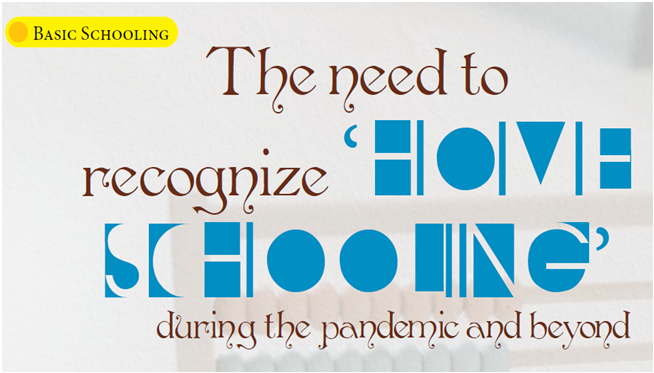
Homeschooling is the practice of educating a child at home rather than in a school (Collins Dictionary, 2021). Also known as home education or Elective Home Education (EHE), it is the education of school-aged children at home or in a variety of places other than school. Usually conducted by a parent, tutor, or an online teacher, many home school families use less formal, more personalized methods of learning that are not always found in schools. The actual practice of homeschooling can look very different.
The spectrum ranges from highly structured forms based on traditional school lessons to more open, free forms, which is lesson and curriculum free. Some families who initially attended a school, go through a de-school phase to break away from school habits and prepare for homeschooling. While "homeschooling" is the term commonly used in North America, "home education" is primarily used in Europe and many Commonwealth countries.
- Concept of Home Schooling
The modern home school movement began in the 1970s when John Holt, an educational theorist and supporter of school reform, began arguing that formal schools’ focus on rote learning creates an oppressive classroom environment designed to make children compliant employees. Holt called for parents to liberate their children from formal education and instead follow a method today known as “unschooling”. Early Holt followers connected through Holt’s newsletter, Growing Without Schooling, which was founded in 1977.
Soon after Holt’s argument inspired the first homeschoolers, Holt’s friend educational theorist Raymond Moore added his voice, arguing that early schooling was detrimental to children and that children should be schooled at home until aged eight or nine in order to give them a firm educational, psychological, and moral foundation. Moore’s 1981 Home Grown Kids quickly became popular and was often the first book homeschoolers read (Coalition for Responsible Home Education, 2021).
In India, the legality of homeschooling and a plethora of alternative education schools spread over different states has been debated by educators, lawmakers, and parents since the passing of the Right of Children to Free and Compulsory Education Act (RTE) which makes formal education a fundamental right of every child between the ages of 6 to 14 and specifies minimum norms for schools. While the legality of homeschooling still remains a grey area, there have been petitions by parents and alternate schools in the past for granting relief. As per the Universal Declaration of Human Rights to which India is a signatory, it quotes "Parents have a prior right to choose the kind of education that shall be given to their children". In recent years, quite a few homeschooled children in India have made a splash by being accepted into stellar institutions such as IIT and MIT. A number of them also choose to be integrated into mainstream education at some point.
- Legalities
The story of the legalization of homeschooling is really fifty different stories. Oversight of homeschooling today differs widely from country to country. Some countries have no oversight at all, while others impose various requirements such as testing or curriculum approval.
In India, there is certainly no awareness regarding homeschooling. The government of India has an RTI Act in place that states that compulsory education to every kid between the ages of 7-14 should be provided. However, the government has failed to clarify any fact regarding homeschooling.
S Maxwell Lyngdoh
To read the further articles please get your copy of Eastern Panorama May, June issue @http://www.magzter.com/IN/Hill-Publications/Eastern-Panorama/News/ or mail to contact @easternpanorama.in


